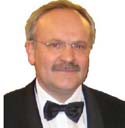Keynote Speaker

Prof. Sigitas Tamulevičius
Member of the European Materials Research SocietyProfessor of the Physics Department, Kaunas University of Technology (KTU), Republic of Lithuania
Speech Title: 2-D Nanostructures of Regularly Arranged Nanoparticles for Sensor Applications
Abstract: Nanoparticles of group 11 metals like Cu, Ag and Au during the last decade attract attention of many researchers because of the localized surface plasmon resonance (LSPR) effect. This effect is important for many of the applications that employ localized surface plasmons and is described as collective charge oscillations confined to metallic nanoparticles. As one of the important emerging applications of such an effect, biomedical applications could be mentioned, where gold nanoparticles are used for plasmon-enhanced photothermal cancer therapy. Metallic nanoparticles of group 11 can act as well as a base of nanoscale devices and sensors with high selectivity and sensitivity. The resonances strongly depend on the local environment, allowing them to be used as ultrasensitive chemical and biological sensors. In addition, the strong electromagnetic field generated in the vicinity of the scatterer can greatly enhance the magnitude of the Raman scattering signal. This enhanced scattering process is known as surface-enhanced Raman scattering (SERS) - a term that emphasizes the key role of the noble metal substrate in this phenomenon. Finally, plasmonic field enhancement has also enabled applications of nanoparticles for improved solar light harvesting and photocatalysis.
In the current lecture the recent research results on the optical studies of colloidal solutions of silver nanoparticles, production of regular two dimensional nanostructures employing capillarity assisted particle assembly as well as studies of surface lattice resonance (mixed mode of LSPR and light diffraction in a regular structure) will be presented and discussed. The steady state light absorption measurements performed together with ultrafast transient pump-probe spectroscopy enabled to define spectral response as well as kinetics of the processes on the picosecond time scale. These issues are important in the mentioned fields of applications including development of smart sensors exhibiting high sensitivity.
Biography: Prof. Dr. Habil. Sigitas Tamulevičius (M) obtained the Physics Engineer degree from the Moscow Engineering Institute in Physics (Moscow, former USSR) in 1979, a Ph.D. degree from the University of Vilnius in 1984, Doctor Habilitus degree from Kaunas University of Technology (1994). From 1990 to 1991, he was postdoc at Royal Institute of Technology (Stockholm, Sweden). In 1994 he was Research Scholar, Fulbright Scholarship, Department of Physics, Massachusetts Institute of Technology (USA). Since 1996 he is full professor at the Physics Department and Research director of the Institute of Materials Science of Kaunas University of Technology. He has co-founded spin-off company, co-authored approx. 240 peer reviewed publications in the field of vacuum and plasma technologies and optical technologies and spectroscopy with more than 2200 citations (h-index: 24), and is (co-) author of 15 textbooks on different aspects of Materials Science. From 2002 he was Member expert and from 2010 he is full Member of Lithuanian Academy of Sciences. Prof. Sigitas Tamulevičius has received series of awards including Soros Foundation Research Grant, (1993) (Awarded by American Physical Society), Fulbright certificate (1997), National Award for Science (2000 and 2019), Recognition letter by the President of EMRS (2010), Honorary Professor of Southern Denmark University (2016), Laureate of Kaunas City Scientist Award (2017). He is Editor in Chief of Scientific Journal “Materials Science (Medžiagotyra)", Member of Editorial Board of “Materials Research express” (IOPScience), American Journal of Nanomaterials“ (Science and Education Publishing), “Coatings” (MDPI), member of steering committee of European doctoral network Physics and Chemistry of Advanced materials. He was a national representative in FP7 programme “Nanosciences, nanotechnologies, materials and new production technologies”. He headed multiple research projects funded by FP, Horizon 2020, COST, Eureka, NordForsk, Lithuanian State Foundation for Research and Studies, the Research Council, as well as Science and Innovation Agency of Lithuania. 15 PhD theses were defended under his guidance; he has supervised five postdoctoral researchers.